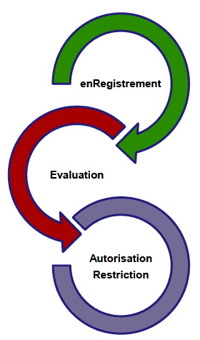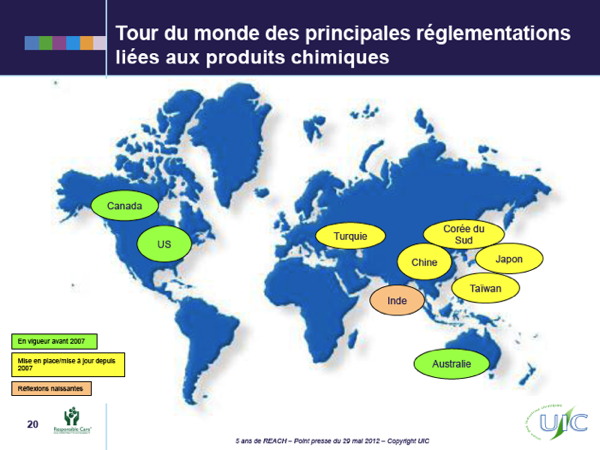
Despite its complexity (more than 800 pages for the Regulation itself and an extra 12,000 for the explanations), the implementation of the European Regulation on the Registration, Evaluation, Authorisation and Restriction of Chemical substances. (REACH) was considered has a successful step, according to the Union of Chemical Industries, who tried in Paris on May 29, to draw an initial review of the first five years of application of the text.
"Thanks to a strong mobilization, French chemical manufacturers have adopted REACH" stresses Jean Pelin, Director General of the UIC, "but we must remain vigilant to ensure a pragmatic implementation of the regulation is done in order to preserve the competitiveness of our businesses" he added.
Soaring costs
The great fear of the French representatives of the chemical industry is indeed the soaring costs associated to REACH. On this point, the Commission estimates were exceeded by a large margin. The latest study available evaluates at EUR 2.1 billion the implementation cost of the first registration deadline, while the cost for all three deadlines had initially been estimated to EUR 2.3 billion.
It must be said that the regulation is not only complex, but it has also forced stakeholders to take up many challenges. Upon entry into force of the text, companies had to organize themselves to meet deadlines, in spite of a difficult start on the side the administration. Thus for the pre-registration process in 2008, some of the guidelines were not completed, the Commission having not ruled on some interpretations. As for the first registration phase, once again the deadlines were met, despite the difficulties of setting up the exchange forums (SIEF) and despite the legal and technical complexity of finalizing the registration dossiers.
As the various aspects of the regulations unfold, manufacturers must assume new tasks. Since 2011, it is for example, the communication of exposure scenarios in supply chains, or the responses to the ECHA [1] assessments.
In addition, the number of companies concerned continues to grow. The next two registration deadlines should concern more SMEs. As for companies downstream in the sector they shall be also concerned. Direct customers, of course, who must in particular provide some feedback on the "specific uses" they make of certain substances, but also companies that do not necessarily see themselves as users of chemical substances, who will have to declare the presence of substances of very high concern (known as "candidate substances") in finished products, when their concentration exceeds 0.1%.
Concerns about competitiveness
In an industry under severe competitive pressure where prices on high tonnage commodities are dependent of the global market, companies can hardly pass on these extra costs, which therefore impact directly their margins.
If for the objective to improve the protection of human health and environment, "progress is noticeable, in terms of improved knowledge in chemicals used in Europe," the UCI emphasises on the fact that REACH also aims to promote the competitiveness of companies. "On this last point, chemical manufacturers find it difficult today to see the competitive advantages offered by REACH in the medium term," worry chemical industry representatives. Even the image of the chemical industry has not been substantially modified by the efforts made by manufacturers.

If at the international level, many countries [2] are changing their regulation on chemicals, REACH remains unique today because of its ambitious objectives and broad scope. Thus for example the United States remains strongly opposed to a purely quantitative system based solely on the tonnages of substances.
Worse, even within the European Union, the differing interpretations of the public authorities lead to distortion of competition.
In such a context, the UCI stresses on the need for a stabilization of the regulatory framework. While the appraisal current conducted by the European Commission could, under the pressure from NGOs, lead to changes in the regulation, the UCI request that no changes are undertaken until all the objectives of REACH, including objective of competitiveness, have not been integrated.




























